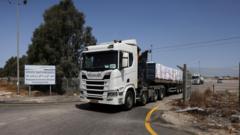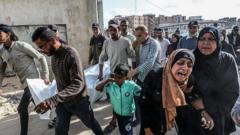Residents face worsening conditions as delays hinder food, medicine, and fuel delivery
Hungry Gazans in Need as Aid Distribution Falters

Hungry Gazans in Need as Aid Distribution Falters
Despite claims of easing blockades, vital supplies still not reaching those in Gaza
Three days after Israel's announcement of a temporary relief in its blockade of humanitarian aid to Gaza, reports indicate that essential supplies are still not reaching those in need. While dozens of trucks carrying food, fuel, and medical supplies have reportedly crossed into Gaza through the Kerem Shalom border crossing, the United Nations has faced significant hurdles in distributing these goods within the region.
U.N. officials, who spoke on condition of anonymity due to the sensitive nature of the situation, cited concerns over potential looting as a key reason for the stalled distribution. As Gazans endure the aftermath of a two-month blockade that severely limited access to necessities, frustrations are mounting. "Today we will mostly eat lentils, or pasta," shared Riyadh al-Housari, a 25-year-old resident of Gaza City, lamenting the fact that families often only manage one meal a day.
The United Nations has pointed to an alarming escalation in food insecurity, declaring that many Gazans are at a "critical risk of famine." A panel of U.N.-backed experts recently warned that unless the blockade is lifted, tens of thousands of children could experience acute malnutrition. However, Israeli authorities have contested these findings, suggesting they stem from inaccurate data and assumptions.
Israel had imposed a ban on humanitarian aid back in early March, claiming that such measures were necessary to compel Hamas to agree to a ceasefire and facilitate the release of remaining hostages. As the situation continues to unfold, the urgency for delivering aid to Gazans has never been greater.
U.N. officials, who spoke on condition of anonymity due to the sensitive nature of the situation, cited concerns over potential looting as a key reason for the stalled distribution. As Gazans endure the aftermath of a two-month blockade that severely limited access to necessities, frustrations are mounting. "Today we will mostly eat lentils, or pasta," shared Riyadh al-Housari, a 25-year-old resident of Gaza City, lamenting the fact that families often only manage one meal a day.
The United Nations has pointed to an alarming escalation in food insecurity, declaring that many Gazans are at a "critical risk of famine." A panel of U.N.-backed experts recently warned that unless the blockade is lifted, tens of thousands of children could experience acute malnutrition. However, Israeli authorities have contested these findings, suggesting they stem from inaccurate data and assumptions.
Israel had imposed a ban on humanitarian aid back in early March, claiming that such measures were necessary to compel Hamas to agree to a ceasefire and facilitate the release of remaining hostages. As the situation continues to unfold, the urgency for delivering aid to Gazans has never been greater.




















